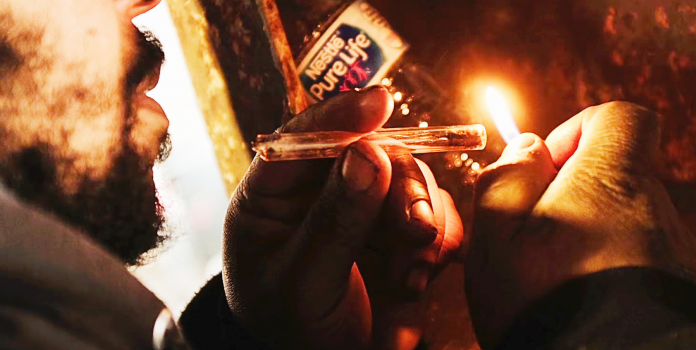(Headline USA) In what appeared to be yet another act of sabotage for the incoming administration with just three days left to go, President Joe Biden added on Friday to his already unprecedented list of pardoned criminals by granting clemency to 2,500 crack-cocaine offenders.
“Today’s clemency action provides relief for individuals who received lengthy sentences based on discredited distinctions between crack and powder cocaine, as well as outdated sentencing enhancements for drug crimes,” Biden said in a statement.
“This action is an important step toward righting historic wrongs, correcting sentencing disparities, and providing deserving individuals the opportunity to return to their families and communities after spending far too much time behind bars.”
Although the offenses themselves were said to be nonviolent, crack is a drug frequently associated with gang crimes and is notoriously addictive. Those returning to the streets of their communities who reintroduce it may have a domino effect, hooking another generation of users.
The CIA has openly acknowledged that durning the 1980s and ’90s, as it sought to overthrow a communist Nicaraguan government, it used the sale of crack–cocaine in Los Angeles to the Bloods and the Crips, two prominent African–American gangs, in order to fund its illicit operations.
Such stories have helped fuel conspiracies the the U.S. government, under both Republican and Democrat leaders, actively funneled the drug into urban community in order to placate and control them, while also destroying many lives in the process.
President Joe Biden’s own son Hunter has openly discussed his own struggles as a so-called crackhead, which resulted previously in his dishonorable discharge from the U.S. Navy and led him to blank out large portions of his life during which he was conducting foreign business deals while trafficking his family name and influence. Hunter was unconditionally pardoned last month for all crimes dating back through January 2014.
Joe Biden claimed in his statement Friday that he was seeking to undo “disproportionately long sentences compared to the sentences they would receive today under current law, policy, and practice.”
The recent round of clemency gives Biden the presidential record for most individual pardons and commutations issued.
The White House did not immediately release the names of those receiving commutations.
Still, Biden said more could yet be coming, promising to use the time before President-elect Donald Trump is inaugurated Monday to “continue to review additional commutations and pardons.”
Friday’s action follows Biden’s commutations last month of the sentences of roughly 1,500 people who were released from prison and placed on home confinement during the coronavirus pandemic, as well as the pardoning of 39 Americans convicted of nonviolent crimes. That was the largest single-day act of clemency in modern history. Among those pardoned were Chinese nationals linked to possible espionage and convicted pedophiles.
Last month, Biden also controversially commuted the sentences of 37 of the 40 people on federal death row, converting their punishments to life imprisonment just weeks before Trump, an outspoken proponent of expanding capital punishment, takes office. Trump has vowed to roll back that order after his term begins.
Biden is also debating the idea of whether to attempt pre-emptive pardons, a constitutionally unsound gambit that would undoubtedly have dangerouns consequences, in order to prevent Trump officials from holding accountable the corrupt partisan actors who weaponized the government against their top political rival and his supporters during Biden’s presidency, effectively turning the U.S. into a banana republic.
If history is any guide, meanwhile, Biden also is likely to issue more targeted pardons to help allies before leaving the White House, as presidents typically do in some of their final actions.
Just before midnight on the final night of his first term, Trump, a Republican, signed pardons and commutations for more than 140 people, including his former chief strategist, Steve Bannon, rappers Lil Wayne and Kodak Black and ex-members of Congress.
Trump’s final act as president in his first term was to announce a pardon for Al Pirro, ex-husband of Fox News Channel host Jeanine Pirro, one of his staunchest defenders. Al Pirro was convicted of conspiracy and tax evasion charges and sentenced to more than two years in prison in 2000.
Bill Clinton controversially pardoned the husband of a major campaign donor, Marc Rich, in what appeared to be an unsavory quid pro quo arrangement like many of those that Biden has brazenly pursued himself, including his recent decision to award Presidential Medals of Honor to alt least three of his top donors and to invite others to state dinners in return for personal gifts and favors.
The pardon deemed most controversial by President Barack Obama was that of Chelsea Manning, the U.S. military defector who delivered secrets to Julian Assange that were published on Wikileaks in one of its first major scoops. Manning, who was born Bradley, underwent transgender surgery while incarcerated.
Trump considered pardoning Assange—whose publication of emails by John Podesta, Hillary Clinton and the Democratic National Committee proved to be a major turning point in the 2016 election—but he ultimately decided against it. However, the transparency activist who had long been seeking refuge in British and Ecuadorian embassies was released as part of a plea deal with the stipulation that he remove his existing documents and discontinue his publication of sensitive classified materials.
Adapted from reporting by the Associated Press

